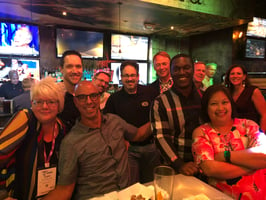Wallflower is a funny term. Those standing on the edge of the crowd in a room, who shrink away from...
Can’t Stop the Feeling
Standing firm in an opinion is admirable. Standing firm in an opinion is foolishness. Which is right? I’ve had managers defend their stance to me in various contexts and situations. And there are times I’ve agreed with them and there are times I’ve not. There are times I’ve had to ask them what they were thinking (a question I have regretted asking upon occasion because they’ve told me).
Whose perspective gets to win out and why? Is it just based upon how we’re feeling? If so, that has to stop.
Often, the person with the most power gets to win. The executive, the c-suite, the board of directors...one of them can pull ahead in the winning viewpoint rather easily. The trick might just be to work with this level in understanding the winning perspective as well as influencing it.
Remember that freshman year of Psych 101? One of the many classic truths taught was that people want to be heard and validated. Our need to belong and to contribute runs deep. When people, especially when they sit on the decision-making team, don’t feel that they can do or be these things, they leave, attack or, perhaps the worst, die inside. We can influence someone who is ready to settle for one of these options.
Perhaps it might be a worthy exercise to provide some case studies to the executive team, leaving out the resolution, in order to foster discussion between them. Why wait until there is a real situation to find out which opinion will win? And from here, understand and influence such an opinion, where appropriate.
If someone has the opportunity to share his/her perspective and to be heard in a safe environment, then the defenses are lowered. A time for conversation and for consideration is easier to foster. It’s here that those details which are illegal or morally questionable can be vetted thoroughly by those decision-makers. It’s here that previous experiences can be shared to offer clarity around a particular perspective. It’s here that the cause of the organization can be upheld stronger so that the decisions made are broader in context.
The natural question that arises here is, “Who decides who is right?” Well, that’s where the forum matters so much. Our ability to foster dialogue is crucial; however, if we cannot do this in an environment where the sharing of thoughts can happen, it will not produce the desired results. Our impact is based upon the results that come from such a time. With the end in mind, it behooves us to ensure that the environment is healthy for dialogue. Remember, just being able to express a view and for it to be heard clearly is a large part of the battle.
But, it must be understood, that there may be a divide between positions. There will have to be an ultimate decision made. Respect for the next steps of those individuals on the opposing side should be offered. If someone feels so strongly about an opinion that he/she needs to leave the organization, then that’s okay. You’ve established an environment for that person to share the different view, as well as to be heard. Being heard is not the same as full agreement. We help cultivate maturity through situations like this.
This is not wishful thinking, by the way. I’ve sat in board meetings where perspectives and opinions were being shared. People were being heard, but these people were also the hearers of others’ expressed opposite viewpoints. It’s not about making everyone think the same. Group think has lots of issues to contend with, too. This is about readying your team to act when it needs to. This is about ensuring a path towards an appropriate response in situations. This is about allowing each other to find out where the edges have to be smoothed out or where they need to be left sharp.
In Mommie Dearest, Faye Dunaway portrays Joan Crawford. It’s an ugly look into the movie star’s life and her influence on her children. There is one ancillary scene towards the end of Joan’s life where her husband, Al Steele, has died and left her with his seat on the board for Pepsi Cola. She attends the first meeting afterwards only to be patronized by the remaining all-male board and “kindly” offered to be excused. It was the first time a woman had been on the board. The men did not know how to respond and had not worked through it ahead of time. They were made to feel ridiculous and she offered a solid perspective on it that they could not dispute, but only to welcome her onto the board.
And while there are laws today which would prevent what Joan Crawford went through, there are still plenty of perspectives out there. Someone has to listen to them, to understand them, to challenge them, even if it’s just to be prepared with a response as to why it’s the way it is. Oh, and “because I said so” is not a thoughtful response or position. Just in case that’s what your plan was.




Blog comments